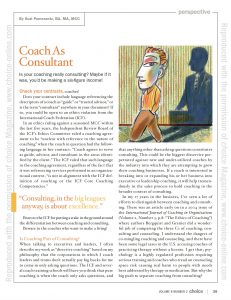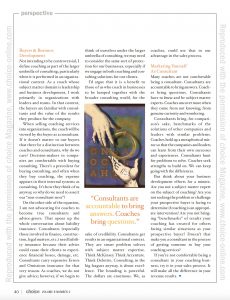
 I am thrilled to share with you a recent article I wrote– “Coach As Consultant” that is published in Volume 8, Number 2, Pages 39-40 of Choice Magazine. This article distinguishes similarities and differences in the roles of Coaching and Consulting. So, are you a coach, consultant, or both? Learn more by clicking here to read the full article.
I am thrilled to share with you a recent article I wrote– “Coach As Consultant” that is published in Volume 8, Number 2, Pages 39-40 of Choice Magazine. This article distinguishes similarities and differences in the roles of Coaching and Consulting. So, are you a coach, consultant, or both? Learn more by clicking here to read the full article.

I sent out the above notice to my mailing list a couple of hours ago and got many responses! A few are captured here, and I’d love for you to chime into the dialogue in the comment box below!
“Excellent repurposing and marketing!” ~GS
“Suzi, begrudgingly opened up the Choice magazine to find your article, boy was I psyched. Great job and so very helpful!” ~JR
“Congrats on this article, Suzi. It’s a good one!” ~JS
“Interesting article and right on mark for me. A major decision for me this past year was not to pursue ICF Certification because my style of coaching– that which resonates with my current and target clinets– does not comply with the ICF definintion of coaching. I suspect there are a lot of ICF-credentialed coaches that fit this bill too.” ~DM
“congrats ! well done” ~MB
“congrats on getting published again! beautiful article and i found the distinction between coaching and consulting intriguing to consider. definitely important but i bet many have not considered the differences.” ~SA
“Great article, I agree with you, in fact I sometimes refer to myself as a consultant even when I am hired as a coach. Thank you ICCO for creating those distinctions for me.” ~SI
“Thank you for the article you wrote, “Coach as Consultant”. It makes me think a little more of how to put myself out in the marketplace.” ~NB
“Interesting question, Suzi, and important to me since I’m one of those “directive coaches.” My clients hire me to be just that, so if I’m doing more than asking questions, does that constitute consulting and make me in violation of my coaching contract?” ~MW
“Great and timely article!!. I would only argue (for self-serving purposes) that some coaches by training and experience have more consulting know-how and formal knowledge about how organizations and their processes work than do those who reduce everything to intra- and interpersonal relationships.” ~FM
“I look forward to reading your article. I glanced at it! I deal with the coach vs consultant every day!” ~AS
“Nice piece Suzi. Well stated and bravo for addressing the ICF ethics controversy.” ~MR
“Love this, Suzi! I TOTALLY agree. This view is a more customer-centered view, too. Sometimes I think we make these finer distinctions as a way to set ourselves off as more important or to show our importance. I don’t think this is as important to those we serve. Bravo…and you took a risk as well v. ICF, which I admire.” ~TF
“I really love this article! Have you read Doug Silsbee’s book, The Mindful Coach? He lists 7 roles a coach plays. I really like the way he describes it, because it includes more than just asking questions as a role of a coach. I don’t believe that the “client always has the answers.” Sometimes they don’t. While it’s certainly not the job of the coach to pose as an “answer giver,” sometimes it is helpful to flat out make suggestions. Well done! The ICF ruling is a bit unsettling though. I think that life coaching and organizational coaching are different than sometimes the ICF accounts for. HBR had a great article on the Wild West of Coaching that talked about the confidentiality issue for example–it being a 3 way design with the hiring manager. Anyway, as you can see you touched on a hot button!” ~CW
“Congratulations on an excellent article. Good job!” ~JL
“I think this is a great article–glad to see the topic addressed so thoughtfully.” ~KN


And the emails keep coming! Here are more comments received yesterday after posting:
“What a great article! I coach small business owners mostly and definitely switch back and forth between coaching and consulting. My contract states coaching and consulting—I wonder if I need to do something with that? However, I do distinguish with the client when I’m coaching and when I’m consulting. I think they’d fire me if all I did was “pure” coaching. Although I teach for CoachU and I do teach “pure” coaching–the longer I’m in the business the more I think of coaching as a skill in my toolbox as a guide or advisor for my clients, just like being an Emotional Intelligence Practitioner is a tool, not a title. Lots of food for thought! Thanks for being bold!” ~ LG
“Great article. It has long been a major irritation for me to hear simplistic, semi-arbitrary distinctions between coaching and consulting by those who are desperately trying to shore up a sense of identity as a coach. There are many flavors of consulting, and they cover a full range of “expert” consulting and “process” consulting. I see no need to swear allegiance to a label. What I do works, and clients could care less what you call it as long as they get great value. Just my humble opinion! Loving your amazing outreach. Keep it going!” ~SL
Hi Suzi
Nice article!
The ICF continues to break its own legs and wonders why it is losing ground in the certification space. What is odd is that their own surveys show that more than 1/2 of coaches also train and consult. Does it make sense to call these people unethical, you would think not. LOL.
Is coaching a profession? Really suspect is life coaching, where the average income is about $25,000 / year. Being an expert at asking questions (and knowing nothing) is a tough sell.
Coaching is definitely a skill, and as such, it is useful for everyone who works with others to improve performance. Is it really a profession? Just asking questions? I agree with you, it is much better to see coaching under the umbrella of consulting. Clients don’t give a damn about coaching purity, only about results.
Something that’s interesting on this front for me is that I became President of Key Change Institute this year. The founder has found a way to change difficult people, especially the ones who don’t want to change. That’s extraordinary! It’s genius! It completely shifts the ground under a lot of worlds: change management, M&A, leadership, managing upward, skills training, and remedial coaching. It also change my own coaching practice. The founder put together an assessment that identifies the person’s core coping skill that blocks them. The result identifies the prescription for a better skill, and the process for acquiring the skill includes a way to instill it as a new habit that becomes automatic. For all my clients who have a pattern, I put them through KCI’s process, and they are permanently transformed in 4 to 7 weeks. (Changing difficult people who don’t want to change takes longer, 8 to 12 weeks). KCI’s process is so good, that KCI guarantees a performance breakthrough, no matter how the client measures it. (When was the last time a coach or a trainer guaranteed results?)
FYI, I bring this up, not only to demonstrate that coaching is going to come under attack from better methodologies (The ICF competencies are just made up, not researched based), but KCI also puts itself under the consulting umbrella. We are solving problems, and business leaders don’t care much about how we do it, just that we do it and do it well.
Thanks for a well written article and doing it right in Choice Magazine. Bravo! You are pretty terrific, do you know that?
Best Regards,
Michael
Great points, Michael! I didn’t realize that about the survey results. I’m looking forward to learning more about the KCI work!
Suzi,
Excellent article. I hate arguing about words instead of actions. I think the real questions are whether you have the competencies necessary to deliver the results your contract calls for and whether you actually deliver those results.
For years before there was such a thing as a business coach I was hired to do consulting and delivered coaching. 😉
Warmly,
Laurie
You are SO right, Laurie! It’s all about getting the results for the clients, and who really cares what we call it?! 🙂
Suzi, thanks for articulating so well what a lot of people developers I am sure have been feeling. True for me. I look forward to more of your thought leadership. Best, Nick
Thanks, Nick! I’m amazed at how many people have responded like you…and I thought I was the only one who thought that way.